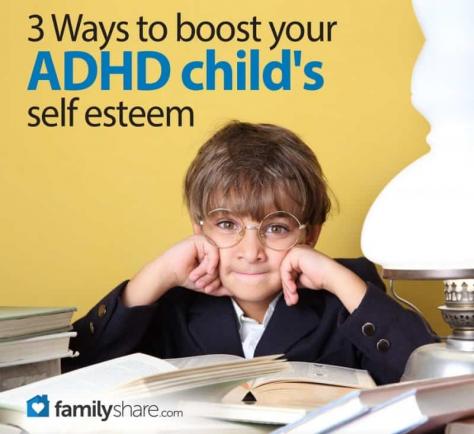
There is no question that raising a child with ADHD is challenging and exhausting. As the parent of an ADHD child, you might find yourself focusing on issues such as defiant behavior, discipline and establishing a structured routine. But have you ever wondered how things are going for your child in his world? As your child gets older and starts going to school and participating in extracurricular activities, your level of influence over his day-to-day activities becomes limited. When he walks out that door, he is essentially on his own to navigate through his world of peer groups, social interactions and other people in positions of authority.
You child's ability to succeed in academics, extracurricular activities and relationships depends on her level of self-esteem. This is an area that ADHD children really struggle with, but a high self-esteem is critical to your child's growth and development. In an article posted on ADDitude, Dr. Larry Silver says that children need two things in order to feel good about themselves: a sense that they are successful both socially and academically and unconditional love from their parents. If either ingredient is missing, a child will have a hard time developing a sense of self-esteem. He or she might have inherent feelings of inadequacy and feel destined for failure as if there is no point in trying to accomplish anything.
A high self-esteem is not something that an ADHD child can achieve by herself. Self-esteem must be nurtured throughout a child's life and into adulthood. As Dr. Silver suggests, the foundation for a strong self-esteem is created in the environment that you provide for her. The following are three ways you can help boost and maintain your child's self-esteem.
Provide unconditional love
Throughout a given day, your child will interact with a variety of people (friends, unfriendly peers, siblings, teachers, school officials). Some interactions will be positive while others will be negative and intimidating. Either way, all of these interactions will have a strong impact on your child's self-esteem. Therefore, it is important that she knows that her home is a safe haven from the world and that no matter what she does, she has your unconditional love and support.
Praise your child often
Praise is important to all children, but to a child with ADHD, praise is as crucial to his growth and development as food and water. You need to praise him for his accomplishments, large or small. A classic scenario is when your son colors a picture and presents it to you for your approval. You tell him it looks good, proudly display the picture on the refrigerator and go on with your life. It's better, however, for an ADHD child if you are more detailed with your praise.
For example, my 9-year-old daughter loves to color and make crafts. She works hard on every project as if it were going into a museum. I used to offer the perfunctory parental praise saying, "This looks nice." However, I have learned that it's better to provide more detail in my praise: "I like the color you chose for this part of the picture," or, "You have done a good job filling in the gaps between crayon strokes. Your ability to color small parts of a picture has really improved." This kind of praise motivates her to keep working to improve her abilities in the areas that I mentioned.
Teach your child how to deal with criticism
Naturally, it's important to use constructive criticism as your child learns new skills. This kind of criticism is usually prefaced by what your child did well followed by what he or she can improve on. However, you can't guarantee that everyone your child interacts with will offer criticism in a constructive and uplifting fashion. By nature, ADHD children have fragile egos. Taking criticism (even constructive) is very difficult and it can often damage their self-esteem. Nevertheless, criticism is a part of learning and developing a level of maturity necessary to function in society.
In addition to providing your own constructive advice, you need to teach your child that he will face criticism throughout his life. And some people will be less forgiving than others. The important thing is your child needs to recognize that nobody learns anything new without making mistakes and mistakes do not define him as a failure.
Your ADHD child will have many difficulties and obstacles as he pursues his life and career goals. Having a high self-esteem will help him overcome these obstacles. You can't accompany your child with everything he does in life, but you can help boost his self-esteem so he can overcome the trials he will face.

